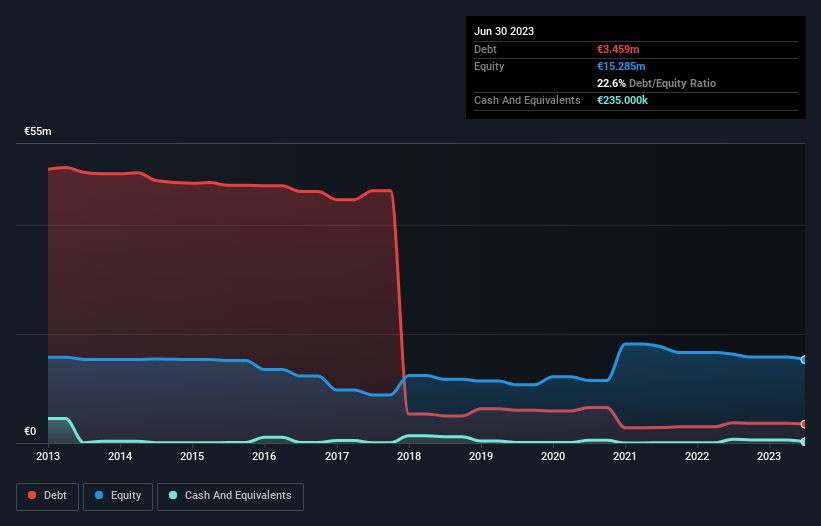David Iben put it well when he said, 'Volatility is not a risk we care about. What we care about is avoiding the permanent loss of capital.' So it might be obvious that you need to consider debt, when you think about how risky any given stock is, because too much debt can sink a company. As with many other companies Compagnia Immobiliare Azionaria S.p.A. (BIT:CIA) makes use of debt. But should shareholders be worried about its use of debt?
What Risk Does Debt Bring?
Debt and other liabilities become risky for a business when it cannot easily fulfill those obligations, either with free cash flow or by raising capital at an attractive price. In the worst case scenario, a company can go bankrupt if it cannot pay its creditors. However, a more usual (but still expensive) situation is where a company must dilute shareholders at a cheap share price simply to get debt under control. Of course, plenty of companies use debt to fund growth, without any negative consequences. When we examine debt levels, we first consider both cash and debt levels, together.
See our latest analysis for Compagnia Immobiliare Azionaria
What Is Compagnia Immobiliare Azionaria's Debt?
As you can see below, Compagnia Immobiliare Azionaria had €3.46m of debt at June 2023, down from €3.69m a year prior. However, because it has a cash reserve of €235.0k, its net debt is less, at about €3.22m.

How Strong Is Compagnia Immobiliare Azionaria's Balance Sheet?
We can see from the most recent balance sheet that Compagnia Immobiliare Azionaria had liabilities of €7.82m falling due within a year, and liabilities of €2.68m due beyond that. Offsetting this, it had €235.0k in cash and €2.72m in receivables that were due within 12 months. So its liabilities total €7.55m more than the combination of its cash and short-term receivables.
The deficiency here weighs heavily on the €4.06m company itself, as if a child were struggling under the weight of an enormous back-pack full of books, his sports gear, and a trumpet. So we'd watch its balance sheet closely, without a doubt. After all, Compagnia Immobiliare Azionaria would likely require a major re-capitalisation if it had to pay its creditors today. The balance sheet is clearly the area to focus on when you are analysing debt. But it is Compagnia Immobiliare Azionaria's earnings that will influence how the balance sheet holds up in the future. So when considering debt, it's definitely worth looking at the earnings trend. Click here for an interactive snapshot.
Given it has no significant operating revenue at the moment, shareholders will be hoping Compagnia Immobiliare Azionaria can make progress and gain better traction for the business, before it runs low on cash.
Caveat Emptor
Importantly, Compagnia Immobiliare Azionaria had an earnings before interest and tax (EBIT) loss over the last year. Its EBIT loss was a whopping €781k. Considering that alongside the liabilities mentioned above make us nervous about the company. It would need to improve its operations quickly for us to be interested in it. Not least because it burned through €1.0m in negative free cash flow over the last year. That means it's on the risky side of things. There's no doubt that we learn most about debt from the balance sheet. But ultimately, every company can contain risks that exist outside of the balance sheet. Case in point: We've spotted 5 warning signs for Compagnia Immobiliare Azionaria you should be aware of.
Of course, if you're the type of investor who prefers buying stocks without the burden of debt, then don't hesitate to discover our exclusive list of net cash growth stocks, today.
New: AI Stock Screener & Alerts
Our new AI Stock Screener scans the market every day to uncover opportunities.
• Dividend Powerhouses (3%+ Yield)
• Undervalued Small Caps with Insider Buying
• High growth Tech and AI Companies
Or build your own from over 50 metrics.
Have feedback on this article? Concerned about the content? Get in touch with us directly. Alternatively, email editorial-team (at) simplywallst.com.
This article by Simply Wall St is general in nature. We provide commentary based on historical data and analyst forecasts only using an unbiased methodology and our articles are not intended to be financial advice. It does not constitute a recommendation to buy or sell any stock, and does not take account of your objectives, or your financial situation. We aim to bring you long-term focused analysis driven by fundamental data. Note that our analysis may not factor in the latest price-sensitive company announcements or qualitative material. Simply Wall St has no position in any stocks mentioned.
About BIT:CIA
Compagnia Immobiliare Azionaria
Operates in the real estate sector in Italy.
Low with imperfect balance sheet.
Market Insights
Community Narratives



